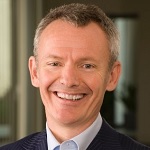 |
| eFFECTOR CEO Steve Worland |
More than two years after landing a hefty launch round, San Diego-based eFFECTOR Therapeutics has scooped up a $40 million financing from an expanded group of investors, putting the biotech on track to jump into the clinic with a Phase I/II study of its lead cancer drug.
New investor Altitude Life Science Ventures led the way on the round, which brings the total raised from a syndicate that includes AbbVie ($ABBV), Novartis ($NVS) and GlaxoSmithKline ($GSK) to $95 million. AbbVie Biotech Ventures and BioMed Ventures also joined for the first time, contributing alongside Abingworth, Novartis Venture Fund, SR One (GlaxoSmithKline), The Column Group, US Venture Partners, Astellas Ventures, Osage University Partners and Mission Bay Capital.
Their money will back a test of eFT508, a lead drug that is designed to inhibit MNK1 and MNK2--MAP kinase-interacting kinase 1 and 2--which manage signals from pathways involved in tumor survival and growth. The plan now is to test it in a range of solid tumors in humans--eFFECTOR isn't identifying which solid tumors just yet--as a monotherapy. And the company also plans to go into lymphoma in early 2016 as well.
The biotech raised the money needed to keep the asset in-house, holding off on any partnering activity until the company can build more value and position themselves for combination deals with other companies, leaving the main asset unencumbered.
The company raised $55 million for its Series A, which was ample enough to get into the clinic on its own, says CEO Steve Worland. "The plan now is to go broad, quickly," he adds.
"You have to have a plan to fund it yourself," adds Worland, who's very much interested in staying clear of licensing deals on the main product--at least for now. The purpose of the Series B was to fund a "robust clinical development plan, and the "new investors also wanted to own the asset."
This isn't Worland's first biotech. He also helmed Anadys, which built a staff of around 50 to 70 in the four years leading up to Roche's ($RHHBY) buyout in 2011. eFFECTOR has 27 staffers, and while it may grow a bit, Worland is keen to manage a smaller operation with the help of key vendors, a popular model for company building in biotech. The whole infrastructure for outside support has developed dramatically in recent years, says Worland, who's also not a big fan of the completely virtual biotech model.